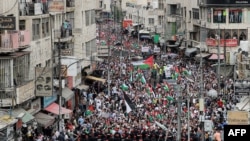Arab allies of the United States continue to press for a cease-fire in the Israel-Hamas war as Palestinian civilian deaths mount at an alarming scale in Gaza. Analysts say that as anger grows on the Arab street over civilian casualties and enormous destruction, Arab leaders worry that the security of their countries and, potentially, the entire region, is increasingly at risk.
Mideast analyst Nicholas Heras at the Washington-based New Lines Institute for Strategy and Policy points to U.S. allies Egypt and Jordan as Arab states that are playing a particularly pivotal role in Israel’s conflict with Hamas. The two countries have the region’s longest-lasting peace treaties with Israel and have had “close intelligence and security cooperation” with the Jewish state.
Jordan’s King Abdullah hosted a meeting last week between U.S. Secretary of State Antony Blinken and the heads of several Arab countries. The Arab leaders insisted on an urgent cease-fire to bring in badly needed medical and humanitarian aid for Gaza’s civilians, who are facing death and destruction from Israeli bombardment of Hamas militants. The U.S. and other G7 countries have pressed Israel to allow “humanitarian pauses and corridors” to allow for the delivery of aid and the release of hostages.
Video report by Natasha Mozgovaya
Heras told VOA that Egypt and Jordan are vigorously working for a two-state solution to the Israeli-Palestinian conflict and would reject any Israeli moves to forcibly displace Palestinians into their countries.
He said that concern is particularly acute for Jordan.
“Both those countries have the potential to have very restive and angry populations turning on their governments," he said. "Jordan has dealt pragmatically with Israel, but it’s also exposed in a lot of ways because the majority of the population of Jordan happens to be Palestinian by descent. Jordan has responsibility for the Islamic holy sites in Jerusalem. Jordan is a country that, even before this conflict erupted, was under severe economic pressure that has led to an increase in social, political activism.”
“The whole region is sinking in a sea of hatred that will define generations to come,” Jordanian Foreign Minister Ayman Safadi warned. He said that any day-after scenario for Gaza “is not going to be discussed except after the war and the killing are stopped.”
Saudi Arabia and the United Arab Emirates have condemned Israel’s conduct in the war. Bahrain has cut business ties with Israel, while Jordan and Turkey have withdrawn their ambassadors. The Organization of the Islamic Conference will host a summit on Gaza in Saudi Arabia on Saturday.
“Long-term resentment among the Arab public is fuel for extremist groups,” Elham Fakhro, an associate fellow at Chatham House’s Middle East Program in London, told The New York Times, adding, “The region is already walking a delicate balance.”
Video report by Yan Boechat
“The conflict has already spread from Gaza to the West Bank,” Bruce Riedel, emeritus senior fellow at Washington’s Brookings Institution, told VOA.
“What began as a war between Israel and Hamas in Gaza has now spread to a war between Israel and the Palestinians in Gaza and the West Bank, [where] much of it is caused by [Jewish] settler violence," he said. "American allies like [Jordan’s] King Abdullah, the Bahrainis are feeling very threatened. They are pleading with the Americans to get the Israelis to stop the bombardment of Gaza.”
“I will say very candidly, this conflict has roiled up a huge amount of public anger towards Israel, towards us,” Barbara Leaf, the U.S. assistant secretary of state for Near Eastern Affairs, told the U.S. House Foreign Affairs Committee this week. “This is something we're going to have to work through.”
Meanwhile, the Jordanian Air Force on Sunday airdropped tons of urgent medical supplies to its field hospital operating in Gaza under difficult conditions. The action was taken in coordination with Israel.
Israel’s blockade and siege of Gaza have put some hospitals out of service, and humanitarian agencies report that aid deliveries through the Rafah border crossing with Egypt have so far been inadequate, as essential services in Gaza deteriorate.









